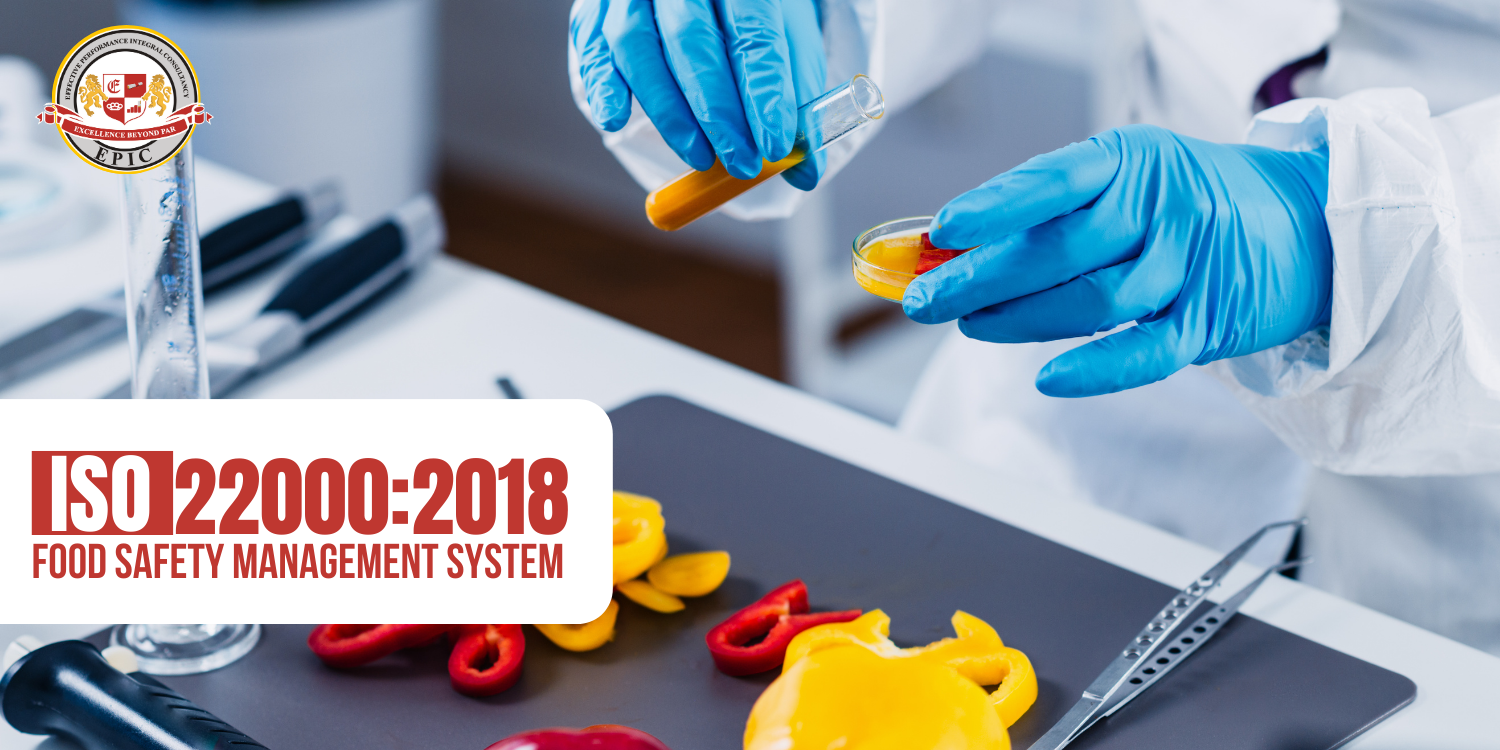
ISO standards play a critical role in ensuring quality, safety, and efficiency across industries. Among them, ISO 22000:2018 Food Safety Management Systems (FSMS) is pivotal for organizations handling food products. At EPIC, we recognize the importance of equipping professionals with the knowledge and skills needed to implement these standards. Through our tailored and comprehensive ISO training, we help businesses achieve compliance, improve processes, and ensure customer satisfaction.
This guide dives into the significance of ISO 22000:2018, highlights the benefits of a food safety course, and explains how our training programs stand out. Also learn who should enroll in this course.
ISO 22000:2018 is an internationally recognized standard that integrates food safety management principles. It outlines a framework for managing food safety risks at every stage of the supply chain. This standard applies to all organizations in the food industry, from production to distribution.
· A process-based approach focusing on continuous improvement.
· Integration of the Plan-Do-Check-Act (PDCA) cycle.
· Compatibility with other management standards like ISO 9001.
· Hazard Analysis and Critical Control Points (HACCP) principles.
At EPIC, our ISO training ensures that participants understand these principles and can apply them effectively within their organizations.
Food safety is a global concern, and compliance with ISO 22000:2018 offers several advantages:
· Enhanced Consumer Trust: Certification assures customers that your products meet the highest safety standards.
· Regulatory Compliance: Adhering to ISO 22000:2018 aligns with national and international food safety regulations.
· Risk Mitigation: The standard helps identify and address food safety hazards proactively.
· Market Expansion: Certification opens doors to global markets where ISO standards are mandatory.
Our food safety course is designed to help businesses unlock these benefits while ensuring operational excellence.
ISO training provides a comprehensive understanding of the standard’s requirements and equips participants with the tools to implement them. At EPIC, we focus on the following key areas:
1. Standard Interpretation:
Gain insights into the clauses and terminology used in ISO 22000:2018.
2. HACCP Implementation:
Learn how to develop and implement HACCP plans tailored to your operations.
3. Risk Assessment:
Understand how to identify, evaluate, and control food safety hazards.
4. Audit Preparation:
Our training covers internal audits, ensuring you’re ready for certification audits.
5. Continuous Improvement:
Discover techniques for maintaining compliance and driving improvements over time.
By focusing on these elements, we ensure that our participants are not just compliant but also confident in managing food safety systems.
Our food safety course is tailored to meet the needs of diverse organizations, from small businesses to multinational corporations. Here’s why our training stands out:
1. Practical Approach:
We emphasize real-world application, ensuring that participants can implement what they learn immediately.
2. Expert Trainers:
Our instructors are industry experts with years of experience in food safety and ISO standards.
3. Flexible Delivery:
Choose from in-person sessions or online modules, depending on your preferences and schedule.
4. Comprehensive Materials:
Our course includes case studies, templates, and checklists to facilitate learning.
We believe that effective training is not just about meeting standards but also about fostering a culture of safety and quality within your organization.
Certification involves several steps, and our ISO training ensures you’re prepared for each stage:
Gap Analysis:
Assess your current processes against ISO 22000:2018 requirements.
Planning:
Develop a road-map for addressing gaps and achieving compliance.
Implementation:
Integrate ISO principles into daily operations, from documentation to employee training.
Internal Audit:
Conduct internal audits to identify areas for improvement.
Certification Audit:
Prepare for an external audit by a certification body.
We guide participants through each step, providing support and resources to simplify the journey.
Our training programs are ideal for:
Food safety managers and supervisors.
Quality assurance professionals.
Business owners in the food industry.
Employees involved in food production, processing, or distribution.
Whether you’re new to ISO standards or looking to enhance your knowledge, our courses cater to all experience levels.
Implementing ISO 22000:2018 is not just about compliance; it’s a strategic investment in your business. Here’s how it drives performance:
Improved Efficiency:
Streamlined processes reduce waste and enhance productivity.
Stronger Reputation:
Certification signals your commitment to quality and safety, attracting customers and partners.
Better Risk Management:
Proactive hazard identification minimizes disruptions and protects your brand.
Employee Engagement:
Training fosters a sense of ownership among employees, improving morale and performance.
By participating in our food safety course, you position your organization for long-term success.
Q1: What is ISO 22000:2018?
ISO 22000:2018 is a global standard for food safety management that ensures safe practices across the food supply chain.
Q2: Why is ISO training important?
ISO training equips individuals with the knowledge to implement and maintain compliance with ISO standards effectively.
Q3: How long does it take to get certified?
The timeline varies based on the organization’s preparedness and the certification body’s processes.
Q4: Is ISO 22000:2018 relevant to small businesses?
Yes, the standard applies to organizations of all sizes involved in the food industry.
Q5: What sets EPIC’s training apart?
Our practical approach, experienced trainers, and comprehensive materials make us a trusted partner for ISO training.
At EPIC, we are committed to empowering organizations with the skills and knowledge needed to excel. Our training programs are designed to deliver tangible results, from improved compliance to enhanced operational efficiency. By partnering with us, you gain access to:
· Experienced trainers with industry expertise.
· Tailored content that meets your organization’s needs.
· Ongoing support to ensure sustained success.
Start your journey toward ISO 22000:2018 certification with us today. Visit EPIC Consulting to learn more about our ISO training programs and enroll in our next session.
Achieving ISO 22000:2018 certification is a milestone for any organization in the food industry. At EPIC, we make the journey seamless through our comprehensive ISO training and tailored support. Equip your team with the tools they need to uphold the highest food safety standards and drive continuous improvement. Contact us today to take the first step toward excellence in food safety course.